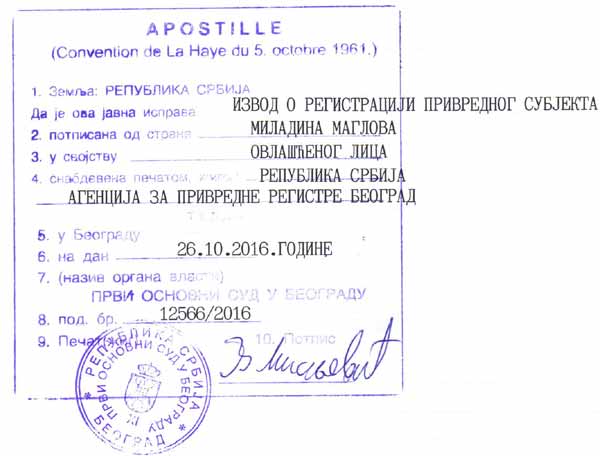
Schmidt & Schmidt компаниясы Сербия аумағында берілген құжаттарды заңдастыру, яғни апостиль қою қызметтерін ұсынады.
Сербия Республикасы 1961 жылғы 5 қазанда қабылданған, құжаттарды апостиль арқылы жеңілдетілген тәртіппен заңдастыру рәсімін енгізген Гаага конвенциясының қатысушысы болып табылады. Сербия 1965 жылғы 24 қаңтарда құжаттарды жеңілдетілген тәртіппен заңдастыру туралы Гаага конвенциясына қосылды (Конвенция Социалистік Федеративтік Югославия Республикасы үшін күшіне енген кезде). 2001 жылғы 26 сәуірде Конвенция бойынша құқықтық мирасқорлықты Югославияның Одағы жариялады, ал 2006 жылғы 9 маусымда Сербия Конвенция бойынша құқықтық мирасқорлықты Черногория Одағы құрамынан шыққаннан кейін растады.
Сербия Республикасында құжаттарға апостиль қоюға ресми түрде уәкілетті органдар – негізгі соттар болып табылады. Мөрде сот төрағасының немесе арнайы уәкілетті судьяның қолы болуы тиіс.
Осылайша сот, әкімшілік, нотариаттық құжаттар, сондай-ақ жария тізілімдерден алынған үзінділер апостиль арқылы куәландырылуы мүмкін.
Сербияда берілген, апостиль қойылған және нотариуспен куәландырылған аудармасы бар құжаттар Қазақстан Республикасында заңды күшке ие.
Сербияда аударманы тек ресми сот аудармашысы жасай алады.
Апостиль Сербияның, Югославия Одағының немесе Социалистік Федеративтік Югославияның ресми органдары берген, серб тілінде немесе СФЮ-ның басқа ресми тілдерінде жасалған құжаттарға қойылады.
Сербияда құжаттарды заңдастыру процесі олардың түпнұсқалығын тексеруді қамтиды. Тексеру аяқталғаннан кейін құжатқа (немесе негізгі сотта куәландырылған көшірмесіне) арнайы мөр — апостиль қойылады. Әдетте апостиль құжаттың артқы бетіне немесе жеке параққа қойылады, содан кейін құжат тігілеп бекітіледі.
Сербиядағы апостиль серб тілінде жасалған, қабырғасының өлшемі кемінде 9 сантиметр болатын төртбұрышты мөр болып табылады. Онда міндетті тақырып «Apostille» және француз тілінде 1961 жылғы Гаага конвенциясына сілтеме (Convention de La Haye du 5 octobre 1961) көрсетіледі. Мөрдің мазмұны Гаага конвенциясымен белгіленген.

Сербияда апостиль қоюға жататын құжаттар
- Сербияның сауда тізілімінен алынған үзінділер
- Нотариус арқылы берілген немесе куәландырылған құжаттар
- Сербия соттары берген құжаттар: үкімдер және сот шешімдері
- Сот аудармашысы жасаған құжат аудармалары
- Сербия мемлекеттік органдары берген ресми құжаттар
- Білім туралы құжаттар: аттестаттар, сертификаттар және дипломдар
- Сенімхаттар, өсиеттер, сыйға беру құжаттары
- Нотариус арқылы куәландырылған құжат көшірмелері
- Басқа да мемлекеттік үлгідегі құжаттар
Сербияда дипломатиялық, консулдық, кедендік құжаттар және паспорттар апостильге жатпайды.
Апостильдің қолданылу мерзімі шектелмейді, бірақ құжаттардың өздерінің қолданылу мерзіміне шектеулер қойылуы мүмкін.
Апостиль мен консулдық заңдастыру арасындағы айырмашылықтар
Апостиль мен консулдық заңдастырудың ортақ белгісі – олар ресми құжаттың басқа елдің мекемелерінде қолданылуы үшін шынайылығын растайды. Алайда олардың арасында елеулі айырмашылықтар бар.
| Апостиль | Консулдық заңдастыру | |
|---|---|---|
| Шындық | Тек Гаага конвенциясына қатысушы елдер арасында ғана қолданылуы мүмкін. | Гаага конвенциясына қатыспайтын немесе қатысушы еместігінен бір немесе екі ел арасында, немесе бір тарап екінші тараптың қосылуына қарсы болған жағдайда қолданылады. |
| Алу қиындығы | Орташа. Апостиль алу үшін құжат берілген елдің уәкілетті органыға жүгіну қажет. | Жоғары. Консулдық заңдастыру үшін құжат берілген елдің әртүрлі органдарына және консулдықтарға жүгіну қажет |
| Алдын ала растау | Қажет емес. | Қажет. Құжатты берген органнан алдын ала растау қажет. |
| Мақсат елінің консулдығында заңдастыру | Мақсат елінің консулдығына жүгіну қажет емес. | Заңдастырудың соңғы кезеңі әдетте құжат берілген елде мақсат елінің консулдығында өтеді. |
Сербиядан құжаттарды талап ету
Көбінесе азаматтық хал актілеріне қатысты құжаттар жоғалып кетеді немесе бүлінеді, не болмаса құжаттардың өзекті көшірмелерін алу қажет болады. Мұндай жағдайда құжаттардың дубликаттарын истребование ету қажет. Бұл рәсімде Сербиядан көшіп кеткен адамдар жиі қиындықтарға тап болады. Біздің сервис Сербиядан құжаттарды қашықтан истребование етуге мүмкіндік береді және құжатты әлемнің кез келген нүктесіне курьерлік жеткізуді жүзеге асыра аламыз.
Құжаттардың нотариаттық аудармасы
Көп жағдайда мемлекеттік органдар тек мемлекеттік тілде жасалған құжаттарды қабылдайды. Сондықтан апостильмен куәландырылған және шет тілінде жасалған шетелдік құжаттарды тағайындалған елде пайдалану үшін оларды аударып, аудармасын нотариаттық куәландыру қажет. Бізде құжаттардың нотариаттық аудармасын қазақ немесе орыс тілдеріне жасауға тапсырыс бере аласыз.
Аудармаға апостиль қою қажет пе?
Бір елде беріліп, басқа елде қолдануға арналған кез келген шетелдік құжат заңдастырылуы тиіс. Есте сақтаған жөн: Сербияда апостиль қойылған құжаттың орыс тіліне аудармасы әлі де шетелдік құжат мәртебесін сақтайды және оған апостиль қою қажет болады. Осыған байланысты көптеген органдар Сербияда куәландырылған аудармаларды қабылдамауы мүмкін. Мұндай жағдайды болдырмау үшін құжаттарды кейін пайдаланылатын елде аударған дұрыс.
























































